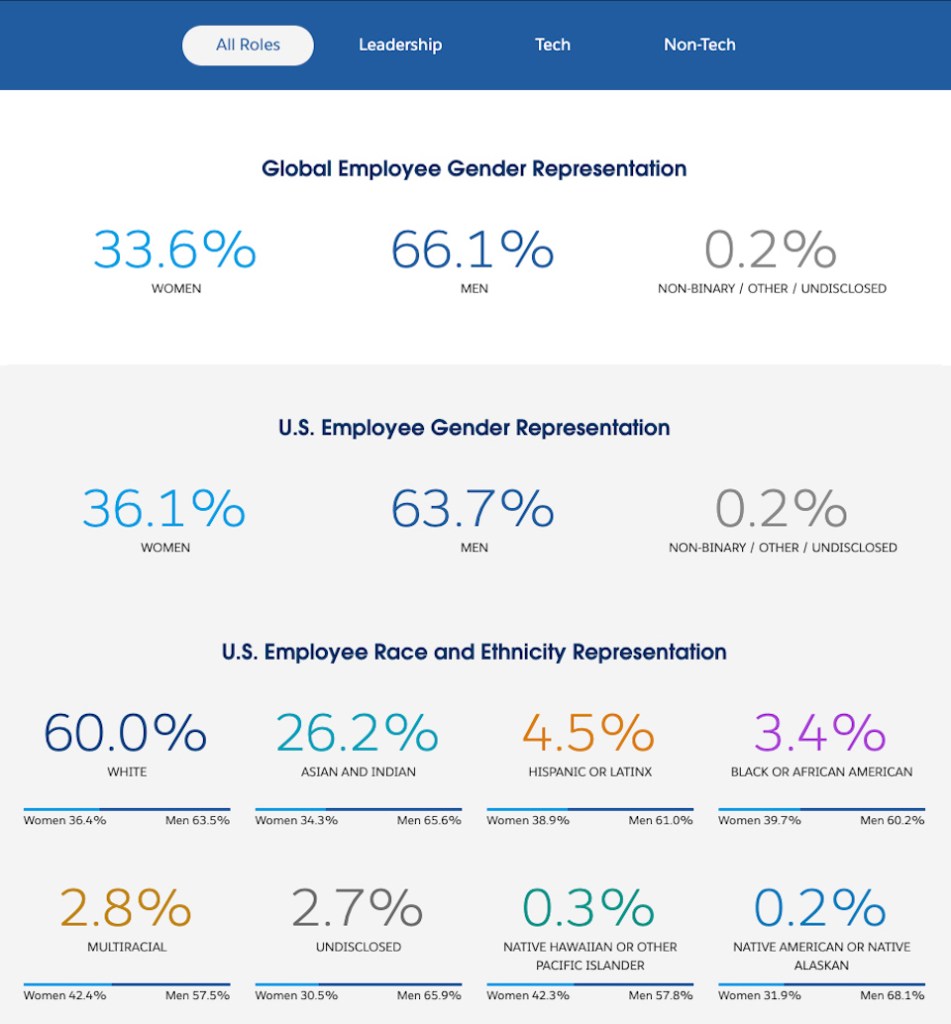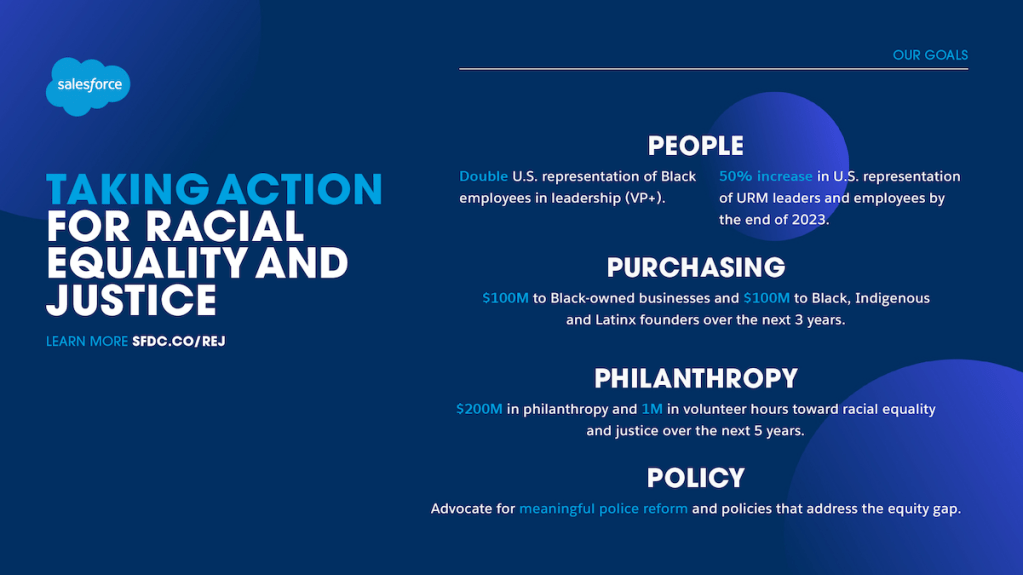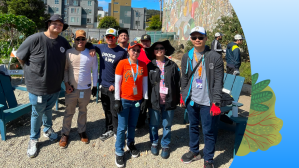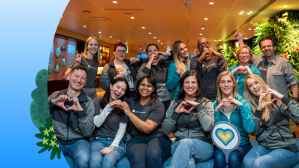Editor’s note: This post was updated on February 19 to reflect the correct figure at the time for URM attrition.
This year has challenged us in ways previously unimaginable. Together, we are facing the global pandemic and the intersecting economic crisis, alongside a reckoning with the long standing racial inequalities across our society.
At Salesforce, we supported those disproportionately impacted by the crises, stood with the Black community, and took action on Racial Equality and Justice. Through this difficult year, we continue working toward our vision of a workplace that reflects society — where everyone feels seen, heard, valued, and empowered to succeed.
Since our last annual and quarterly equality update, we’ve seen increasing progress toward our representation goals. In this update, we’ll share our latest Equality data and programs to support our goals and accelerate progress. We clearly recognize there is still much work ahead.
Our Goal is to Build a Workplace that Looks like Society
In 2019, we introduced a goal of reaching 50% of our U.S. workforce made up of underrepresented groups (Women, Black, Latinx, Indigenous, Multiracial, LGBTQ+ employees, People with Disabilities, and Veterans) by 2023 as well as continuing to increase representation around the globe.
This year, we added two additional goals as part of our company-wide Racial Equality and Justice efforts:
- Leadership Representation Goals: Because representation matters at every level — especially in leadership — our goal is to double the U.S. representation of Black leaders (VP+) and also increase U.S. representation of Underrepresented Minority or URM (Black, Indigenous, and Latinx) leaders by 50% by 2023.
- Overall Representation Goal: Increasing our U.S. representation of URM (Black, Indigenous, and Latinx) employees by 50% by 2023.
Here are our 2020 data, reporting across global gender representation, race and ethnicity in the U.S. — including intersectional data by gender with breakdowns by Leadership, Tech and Non-Tech. (Note: these data do not include Tableau.)
Our Equality Data
Additional U.S. Representation Data
Areas of Progress
We saw progress in the hiring and retention of our URM (Black, Indigenous and Latinx) community in the U.S., alongside initiatives driven by our new Racial Equality and Justice task force such as diversity recruiting teams, retention programs and expanded development opportunities:
- We’ve seen accelerated growth of Black representation in leadership (VP+). Over the last year, representation of Black leaders has increased by more than 50%. In addition, the population of Black Women leaders in the U.S. doubled — albeit from a small base. Overall Black representation is up 0.5 percentage points.
- Over the last year, URM attrition is down 27% and is currently lower than total company attrition.
Further, we see continued progress across all underrepresented groups as we invest in programs like equal pay, voluntary self-ID, mentorship, development and more:
- We moved closer to our goal of 50% of our U.S. workforce being from underrepresented groups (Women, People with Disabilities, LGBTQ+ employees, Veterans along with URM employees) — Now at 47.4% up from 43.9% in 2019.
- Representation of Women continues to grow — now at 36.1% in the U.S. and 33.6% globally. Today, nearly 11K more women work at Salesforce than did 5 years ago.
- Globally, Women in leadership increased significantly from 23.7% in 2019 to 25.5% today.
Areas of Opportunity
We still have more work to do on increasing representation and accelerating voluntary Self-ID adoption:
- Increase U.S. representation of Latinx employees broadly and in leadership — currently at 4.5% overall and 3.1% in leadership. Develop additional strategies and partnerships to grow representation of Indigenous employees.
- Increase U.S. representation of URM employees in Tech – currently at 9.6% in Tech vs. 11.2% for all U.S.employees.
- Continue increasing representation of women in Tech — currently at 24.3%.
- Continue to expand participation in voluntary Self-ID for the LGBTQ+ community, People with Disabilities and Veterans to better understand and empower these employees.
Our Equality Strategies
To reach our goals and accelerate our progress, we’ve announced new initiatives and expanded on our existing programs to support access, retention, belonging and fairness at every stage of the employee journey. These strategies include:
Uniting Equality and Recruiting
Bringing Equality and Recruiting together creates a unique opportunity to lead with our values across the entire employee lifecycle, starting from how we attract and recruit talent. As part of this strategy, we’ve created a diversity recruiting team dedicated to sourcing talent from URM (Black, Indigenous and Latinx) communities, instituted a pilot URM referral program and launched inclusive hiring training for over 1,000 recruiters and interviewers — with plans to scale to all employees — to ensure a fair, consistent and equitable process for all.
Supporting Retention and Belonging
This year we launched the Warmline — an employee advocacy program to help support and empower Black, Indigenous, Latinx and Women employees through confidential conversations with an advocate around issues of belonging, equity and career navigation. We also introduced a new Racial Equality Ally training to help leaders and employees better understand how to interrupt bias, recognize microaggressions and have courageous conversations. More than 6,000 employees have participated since we opened the program in June 2020.
Increasing Access to Opportunities
We are focused on growing our future diverse leaders by scaling three key programs:
- Our Equality Mentorship program connects employees of color with executive mentors, with 600+ participants to date.
- In partnership with the Executive Leadership Council, our in-house URM development program supports employees with tailored leadership curriculum, with 140+ participants to date.
- Career Milestones, a recently launched pilot program for URM career sponsorship and coaching, has 90+ participants to date.
Empowering our Equality Groups
Our Equality Groups are employee-led organizations that support our underrepresented communities. These groups continue to grow, with 1 in 2 employees participating, and BOLDforce — our Black ERG — growing more than 130% this year. Across industry, we often hear that leading an employee resource group can feel like a “second job.” We recognize the incredible value and commitments of this work — these employees are leading equality from the front lines as volunteers. That’s why, starting last year, we offered new recognition and compensation for globally elected Equality group leaders.
Adopting Inclusive Practices
We empower our employees with inclusive business practices and principles which includes Inclusive Hiring, Inclusive Leadership, Inclusive Marketing, and our latest – Inclusive Promotions. This year, we launched an all manager training that includes bias awareness and a new process to help ensure our promotions process is fair, consistent and accessible to all.
Investing in Equal Pay
We are committed to Equal Pay for Equal Work. We evaluate pay on an annual basis to address any gaps among gender globally and race in the U.S. In 2020, we spent $2.1 million to address any unexplained differences in pay, totaling more than $12 million spent to date to ensure our global workforce is paid fairly.
Using Monthly Scorecard to Increase Accountability
Our senior leaders continue to receive monthly overall and VP+ scorecards, detailing headcount, hiring, attrition and promotion data by Gender (Global) and Race (U.S.). We pair our largest organizations with an Equality Board made up of their Recruiting, Employee Success, Equality partners and senior leaders to drive prescriptive actions based on data.
Taking Action for Racial Equality and Justice
Around the world, we continue to grieve George Floyd, Breonna Taylor, Ahmaud Arbery, along with so many others who have been unjustly denied their fundamental rights to justice and life itself. As a company, we believe we have a responsibility to use our platforms for change and take steps to drive racial equality and justice.
Earlier this year we formed the Racial Equality and Justice Task Force to take action across 4 P’s — People, Purchasing, Philanthropy and Policy.
People — driving racial equality in our workplace through new representation goals and programs focused on our Black, Indigenous and Latinx communities.
Purchasing — working to close economic opportunity gaps through our supply chain and investments. Our goal is to spend $100 million dollars with Black-owned businesses and invest $100 million in Black, Indigenous and Latinx founders by 2023.
Philanthropy — supporting organizations driving change. We intend to invest $250 million in philanthropy and 1 million volunteer hours in organizations focused on racial equality and justice over the next five years.
Policy — influencing systemic change. We commit to advocating for meaningful police reform and policies to address the equity gap.
Our Ongoing Commitment
There is clearly significant work ahead. We remain intentional and committed to building a workplace that truly reflects society. We continue to work to elevate voices and leaders of color as well as steps we can all take through our annual racial equality summit. We will continue to share progress and areas of opportunity in our next quarterly Equality update.
Learn more about our commitment to Equality and how you can join us on our path.




















